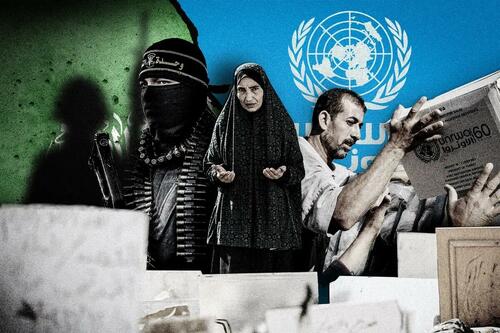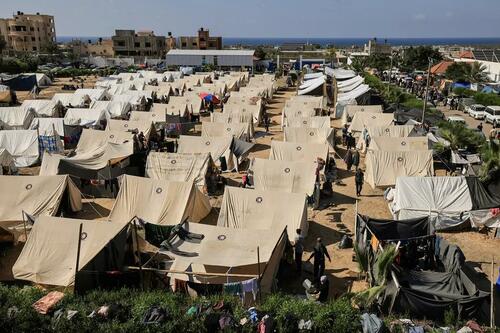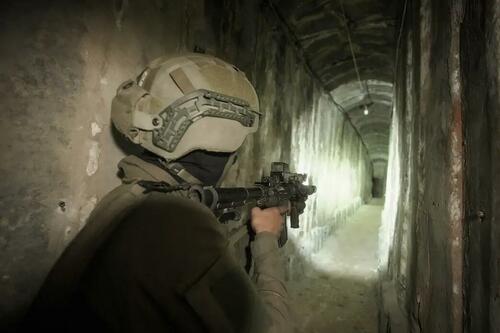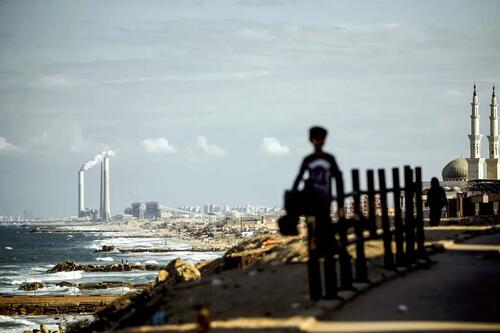
Authored by Dan M. Berger via The Epoch Times (emphasis ours),
A teacher is accused of holding an Israeli hostage in an attic.
The Israel Defense Forces (IDF) says it found rockets near a school in Gaza.
One house of the Swiss parliament votes to cut funding to Gaza. In the United States, Republican senators say Congress should do the same.
All these recent incidents swirl around a controversial agency, the United Nations Relief and Works Agency for Palestine Refugees (UNRWA).

The agency is at the heart of the refugee crisis. Some see UNRWA as a critical provider of services to beleaguered Arab populations of the Gaza Strip and the West Bank, which Israelis often refer to as Judea and Samaria.
Others see it as an enabler of the crisis, an agency meant to perpetuate a “refugee” status no longer applicable to most Palestinians and doing it to obstruct any peace process indefinitely.
Many observers say it’s both—an essential provider of services and an obstacle to peace.
UNRWA’s defenders say it’s just doing the mission assigned by the U.N. almost three-quarters of a century ago.
Opponents say UNRWA is way too close to Hamas, the terrorist group that controls Gaza and triggered the current war with its Oct. 7 massacre of about 1,200 Israelis.
Defenders say Israel is an apartheid state based on immoral religious discrimination. Opponents say Palestinian Arabs displaced by Israel’s 1948 War of Independence should be resettled like 135 other refugee groups overseen by the United Nations High Commissioner of Refugees (UNHCR).
The only refugee situation UNHCR doesn’t handle is Palestine.
“It was born in sin, it exists in sin, and it operates in sin,” Kobi Michael, a senior researcher at the Institute for National Security Studies at Tel Aviv University, said about UNRWA.
“This is a political organization that, at the beginning, served the interests of Arab states that didn’t want to absorb Palestinian refugees into their countries,” he told The Epoch Times.
“They don’t want to rehabilitate Palestinian refugees. They want to keep them in camps and perpetuate their refugee status. It is the central pillar of the Palestinian ethos. This is the excuse for their victimhood. This is why they can get money from the international community, and why they don’t have to be responsible.”
“Unfortunately the international community cooperates with Palestine and UNRWA. Now, under the circumstances of the war, it can’t be dismantled. It’s needed for humanitarian aid. But after the war, the first thing that should be done is the dismantling of the UNRWA and the refugee camps in the Gaza Strip.”
Susan Akram, a Boston University School of Law professor and director of its International Human Rights Clinic, told The Epoch Times she doesn’t think UNRWA is controversial in the least.

“It is pretty effective for those who approach it from the perspective of international law,” she said. “We would not call it controversial. UNRWA was established with a very particular mandate (given to it by the U.N. in 1949), and it has continued to carry out that mandate.”
How effective is it? Israelis across the political spectrum of that deeply divided country say it sponsors schools teaching hate to generations of Palestinian schoolchildren, making peace or a two-state solution impossible.
A UNRWA teacher was accused of having held one of the Israeli hostages seized by Hamas on Oct. 7. The agency rejected the claim as “unsubstantiated.” But an Israeli TV reporter, Almog Boker, posted on X that a released hostage said the teacher, a father of 10 children, had held him in his attic for nearly 50 days, barely providing food and neglecting his medical needs.
And Mr. Boker said another abductee had been held captive by a Gazan doctor simultaneously caring for children.
“These are not isolated incidents; these civilians are terrorists,” Mr. Boker said. “Present at the Saturday massacre, they’re now revealed as integral to holding hundreds captive, including women and children.”
On Dec. 1, 2023, in a public statement, UNRWA said it hadn’t been able to substantiate whether the Israeli journalist’s allegations about an UNRWA teacher holding an Israeli hostage were “genuine or false.”
“UNRWA reiterates that it takes all allegations of breach of U.N. principles extremely seriously and immediately investigates them,” the agency said.
“Defamation attacks and the spread of misinformation about UNRWA—from any side—directly endanger the lifesaving operations of the agency and its staff operating on the ground.”
Israel has long maintained that Hamas used schools and health facilities, which in Gaza are operated by UNRWA, to shield its terror operations.
The Israeli government on Jan. 3 released a video interview of a Gaza civilian who says a Hamas operative herded his group into Al Shifa Hospital when they were trying to follow IDF instructions to flee south. Terrorists were living under the hospital, but knowing Israeli soldiers were coming, they emerged and hid among the civilians. “I felt that we are human shields,” the civilian said.
The Israeli military said on Jan. 3 that it had dismantled an 800-foot tunnel underneath Al Shifa Hospital in Gaza City, which UNRWA operates.
Israel and the United States doubled down on assertions that the hospital has shielded not only a Hamas tunnel underneath but a command hub that was also used to store weapons.
Hamas had destroyed documents and electronics just before the IDF’s Nov. 15 seizure of the hospital, a U.S. National Security Council spokesman said.

Birth of a Crisis
The refugee crisis began when the U.N. partitioned the land into two states, one for Jews and one for Arabs, in 1947. Israel took the deal. Local Arabs and surrounding Arab states did not. Their armies invaded Israel on the first day of its independence in 1948.
Around 700,000 Arab residents fled, some out of fear, and others because they were encouraged to by Arab leaders, who assured them the war would be over in a few weeks.
A similar number of Jews fled Arab states in North Africa and the Middle East, places where Jews had lived for hundreds or even thousands of years. They came to Israel.
Some Arabs stayed in Israel. Today they are citizens, vote, and have representatives in Israel’s Knesset.
Arabs who fled found themselves in Gaza, the West Bank, Jordan, Syria, and Lebanon. The U.N. agency was established in 1949 to administer to them. It is distinct from the U.N. High Commissioner for Refugees, which was created in 1950 for all other refugee crises around the world. The Palestinians are the only refugees with their own U.N. agency.
Are They Still Refugees?
Words like “refugees” and “refugee camps” can be misleading. They often don’t fit the realities on the ground. Gaza communities started 75 years ago look no different than areas around them, with permanent buildings decades old, occasional fancy villas, and a street grid. Families may be into their fourth and fifth generations living there. They may be marked off with gates setting them off from the adjoining city, but otherwise look the same.
“When the general public thinks of a traditional United Nations refugee camp, we’re thinking of those tent camps set up on the borders of Syria, handling massive refugee populations out of the Syrian Civil War,” Eli Sperling, a teaching fellow at the University of Georgia’s Israel Institute, told The Epoch Times.
“We’re thinking tents. We’re thinking temporary infrastructure. We’re thinking something that resembles a camp.
“There is basically nothing that you would see while walking around these areas … that would indicate this is a refugee camp,” he said.

There are even fancy neighborhoods with villas in some of the “camps,” said Mr. Michael.
Ismail Haniyeh, the senior Hamas leader, chairman of its political bureau, and from the Al-Shati refugee camp, bought a fine half-acre beachfront property in the adjoining Rimal neighborhood in 2010. He has lived in “a palace” in Qatar since 2019, Mr. Michael said. The Gaza house, occupied by his relatives, was destroyed by an IDF air strike in November.
Mr. Haniyeh’s net worth, largely stemming from Hamas’s 20 percent tax on goods imported through tunnels from Egypt, has been estimated as high as $4 billion.
Refugees are typically stateless people, Mr. Michael said. But Palestinians now hold various travel documents up to and including passports.
Estimates range, but from 2.18 million to 2.4 million Palestinian “refugees” in Jordan now are Jordanian citizens and hold Jordanian passports.
The Palestinian Authority declared statehood during the failed 1990s Oslo Accords peace process. Palestine was accorded observer status by the U.N. General Assembly in 2012 but doesn’t vote.
Palestinian refugees—and residents of the West Bank and Gaza who aren’t refugees because they always lived there—are Palestinian citizens and have Palestinian passports, Mr. Michael said.
Ms. Akram disagreed, saying their status and travel documentation are less secure than that, and that it doesn’t apply to all Palestinians who live in Jordan. The Palestinian Authority isn’t a state, and Palestinians still meet the definition of “stateless” under international law, she said.
Mr. Sperling acknowledged that while Palestinians’ documents can permit them to travel, such papers don’t have the same strength as formal passports.
One effect of UNRWA’s unique handling of Palestinian refugees, Mr. Sperling said: 700,000 Palestinian refugees in 1949 have grown to 5.9 million today.
Descendants of other refugee populations usually aren’t classified as refugees.
Read more here...
Authored by Dan M. Berger via The Epoch Times (emphasis ours),
A teacher is accused of holding an Israeli hostage in an attic.
The Israel Defense Forces (IDF) says it found rockets near a school in Gaza.
One house of the Swiss parliament votes to cut funding to Gaza. In the United States, Republican senators say Congress should do the same.
All these recent incidents swirl around a controversial agency, the United Nations Relief and Works Agency for Palestine Refugees (UNRWA).

The agency is at the heart of the refugee crisis. Some see UNRWA as a critical provider of services to beleaguered Arab populations of the Gaza Strip and the West Bank, which Israelis often refer to as Judea and Samaria.
Others see it as an enabler of the crisis, an agency meant to perpetuate a “refugee” status no longer applicable to most Palestinians and doing it to obstruct any peace process indefinitely.
Many observers say it’s both—an essential provider of services and an obstacle to peace.
UNRWA’s defenders say it’s just doing the mission assigned by the U.N. almost three-quarters of a century ago.
Opponents say UNRWA is way too close to Hamas, the terrorist group that controls Gaza and triggered the current war with its Oct. 7 massacre of about 1,200 Israelis.
Defenders say Israel is an apartheid state based on immoral religious discrimination. Opponents say Palestinian Arabs displaced by Israel’s 1948 War of Independence should be resettled like 135 other refugee groups overseen by the United Nations High Commissioner of Refugees (UNHCR).
The only refugee situation UNHCR doesn’t handle is Palestine.
“It was born in sin, it exists in sin, and it operates in sin,” Kobi Michael, a senior researcher at the Institute for National Security Studies at Tel Aviv University, said about UNRWA.
“This is a political organization that, at the beginning, served the interests of Arab states that didn’t want to absorb Palestinian refugees into their countries,” he told The Epoch Times.
“They don’t want to rehabilitate Palestinian refugees. They want to keep them in camps and perpetuate their refugee status. It is the central pillar of the Palestinian ethos. This is the excuse for their victimhood. This is why they can get money from the international community, and why they don’t have to be responsible.”
“Unfortunately the international community cooperates with Palestine and UNRWA. Now, under the circumstances of the war, it can’t be dismantled. It’s needed for humanitarian aid. But after the war, the first thing that should be done is the dismantling of the UNRWA and the refugee camps in the Gaza Strip.”
Susan Akram, a Boston University School of Law professor and director of its International Human Rights Clinic, told The Epoch Times she doesn’t think UNRWA is controversial in the least.

“It is pretty effective for those who approach it from the perspective of international law,” she said. “We would not call it controversial. UNRWA was established with a very particular mandate (given to it by the U.N. in 1949), and it has continued to carry out that mandate.”
How effective is it? Israelis across the political spectrum of that deeply divided country say it sponsors schools teaching hate to generations of Palestinian schoolchildren, making peace or a two-state solution impossible.
A UNRWA teacher was accused of having held one of the Israeli hostages seized by Hamas on Oct. 7. The agency rejected the claim as “unsubstantiated.” But an Israeli TV reporter, Almog Boker, posted on X that a released hostage said the teacher, a father of 10 children, had held him in his attic for nearly 50 days, barely providing food and neglecting his medical needs.
And Mr. Boker said another abductee had been held captive by a Gazan doctor simultaneously caring for children.
“These are not isolated incidents; these civilians are terrorists,” Mr. Boker said. “Present at the Saturday massacre, they’re now revealed as integral to holding hundreds captive, including women and children.”
On Dec. 1, 2023, in a public statement, UNRWA said it hadn’t been able to substantiate whether the Israeli journalist’s allegations about an UNRWA teacher holding an Israeli hostage were “genuine or false.”
“UNRWA reiterates that it takes all allegations of breach of U.N. principles extremely seriously and immediately investigates them,” the agency said.
“Defamation attacks and the spread of misinformation about UNRWA—from any side—directly endanger the lifesaving operations of the agency and its staff operating on the ground.”
Israel has long maintained that Hamas used schools and health facilities, which in Gaza are operated by UNRWA, to shield its terror operations.
The Israeli government on Jan. 3 released a video interview of a Gaza civilian who says a Hamas operative herded his group into Al Shifa Hospital when they were trying to follow IDF instructions to flee south. Terrorists were living under the hospital, but knowing Israeli soldiers were coming, they emerged and hid among the civilians. “I felt that we are human shields,” the civilian said.
The Israeli military said on Jan. 3 that it had dismantled an 800-foot tunnel underneath Al Shifa Hospital in Gaza City, which UNRWA operates.
Israel and the United States doubled down on assertions that the hospital has shielded not only a Hamas tunnel underneath but a command hub that was also used to store weapons.
Hamas had destroyed documents and electronics just before the IDF’s Nov. 15 seizure of the hospital, a U.S. National Security Council spokesman said.

Birth of a Crisis
The refugee crisis began when the U.N. partitioned the land into two states, one for Jews and one for Arabs, in 1947. Israel took the deal. Local Arabs and surrounding Arab states did not. Their armies invaded Israel on the first day of its independence in 1948.
Around 700,000 Arab residents fled, some out of fear, and others because they were encouraged to by Arab leaders, who assured them the war would be over in a few weeks.
A similar number of Jews fled Arab states in North Africa and the Middle East, places where Jews had lived for hundreds or even thousands of years. They came to Israel.
Some Arabs stayed in Israel. Today they are citizens, vote, and have representatives in Israel’s Knesset.
Arabs who fled found themselves in Gaza, the West Bank, Jordan, Syria, and Lebanon. The U.N. agency was established in 1949 to administer to them. It is distinct from the U.N. High Commissioner for Refugees, which was created in 1950 for all other refugee crises around the world. The Palestinians are the only refugees with their own U.N. agency.
Are They Still Refugees?
Words like “refugees” and “refugee camps” can be misleading. They often don’t fit the realities on the ground. Gaza communities started 75 years ago look no different than areas around them, with permanent buildings decades old, occasional fancy villas, and a street grid. Families may be into their fourth and fifth generations living there. They may be marked off with gates setting them off from the adjoining city, but otherwise look the same.
“When the general public thinks of a traditional United Nations refugee camp, we’re thinking of those tent camps set up on the borders of Syria, handling massive refugee populations out of the Syrian Civil War,” Eli Sperling, a teaching fellow at the University of Georgia’s Israel Institute, told The Epoch Times.
“We’re thinking tents. We’re thinking temporary infrastructure. We’re thinking something that resembles a camp.
“There is basically nothing that you would see while walking around these areas … that would indicate this is a refugee camp,” he said.

There are even fancy neighborhoods with villas in some of the “camps,” said Mr. Michael.
Ismail Haniyeh, the senior Hamas leader, chairman of its political bureau, and from the Al-Shati refugee camp, bought a fine half-acre beachfront property in the adjoining Rimal neighborhood in 2010. He has lived in “a palace” in Qatar since 2019, Mr. Michael said. The Gaza house, occupied by his relatives, was destroyed by an IDF air strike in November.
Mr. Haniyeh’s net worth, largely stemming from Hamas’s 20 percent tax on goods imported through tunnels from Egypt, has been estimated as high as $4 billion.
Refugees are typically stateless people, Mr. Michael said. But Palestinians now hold various travel documents up to and including passports.
Estimates range, but from 2.18 million to 2.4 million Palestinian “refugees” in Jordan now are Jordanian citizens and hold Jordanian passports.
The Palestinian Authority declared statehood during the failed 1990s Oslo Accords peace process. Palestine was accorded observer status by the U.N. General Assembly in 2012 but doesn’t vote.
Palestinian refugees—and residents of the West Bank and Gaza who aren’t refugees because they always lived there—are Palestinian citizens and have Palestinian passports, Mr. Michael said.
Ms. Akram disagreed, saying their status and travel documentation are less secure than that, and that it doesn’t apply to all Palestinians who live in Jordan. The Palestinian Authority isn’t a state, and Palestinians still meet the definition of “stateless” under international law, she said.
Mr. Sperling acknowledged that while Palestinians’ documents can permit them to travel, such papers don’t have the same strength as formal passports.
One effect of UNRWA’s unique handling of Palestinian refugees, Mr. Sperling said: 700,000 Palestinian refugees in 1949 have grown to 5.9 million today.
Descendants of other refugee populations usually aren’t classified as refugees.
Read more here…
Loading…





